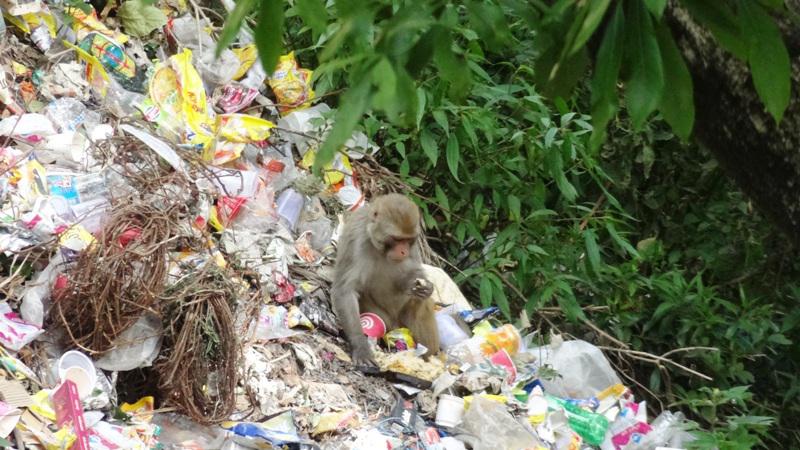Gitanjali Katlam
This study aims to characterize behaviour of vertebrates at garbage dumps adjoining natural habitats, with and without tourism pressures and to raise awareness about the impact of inadequate waste segregation and littering on animals that share space with us.

Rhesus macaque (Macaca mulatta)at the garbage dump in Nainital district.
Inadequate solid waste management around natural reserves poses serious threat to animal welfare. The devastating effects of plastic ingestion by marine vertebrates, domestic ruminants and canids are widely reported. However, we understand very little about plastic ingestion among wild terrestrial vertebrates. Our study proposes to characterize visitation and foraging behaviour of vertebrates at garbage dumps adjoining natural habitats, with and without tourism pressures. We also attempt to identify terrestrial vertebrates most likely to ingest plastic, and characterize the influence of life history traits on the propensity to plastic ingestion.
We aim to sample landscapes in the Corbett Tiger Reserve, a prime destination for nature tourists and Rajaji Tiger Reserve, which comparatively has lesser infrastructure for nature tourism within the north Indian state of Uttarakhand, India. The study will be carried out across four months, during peak winter (mid-November – mid January 2016-17) and summer tourist seasons (mid-March to mid-May 2017) to characterize the following:
· Characterization of the garbage dumps
· Behavioural observations of the animal visitors at the dump site
· Faecal sampling for the presence of the plastic
To collate information we will use methods like camera-trapping, behavioural observations and transects at and around the garbage dumps sites.
The findings from this project will help address a major research gap in our understanding of impacts of improper waste management on wild animals. Through our citizen science platform, we aim to collect information on plastic material reported in fecal samples of vertebrates across India. We aim to conduct workshops and share findings from our work with agencies widely involved in raising awareness about solid waste management at local, state and national level, which could help these agencies to motivate more people to address garbage management. To achieve this, we aim to produce a series of material, in English and Hindi which will be made available through social media, our website and in print.
We also aim to carry out an assessment in rural communities to identify how local people react to this information and to assess any shifts in their solid waste disposal behavior. Our main motivation for this project is to raise awareness about the impact of inadequate waste segregation and littering on animals that share their habitat with us.